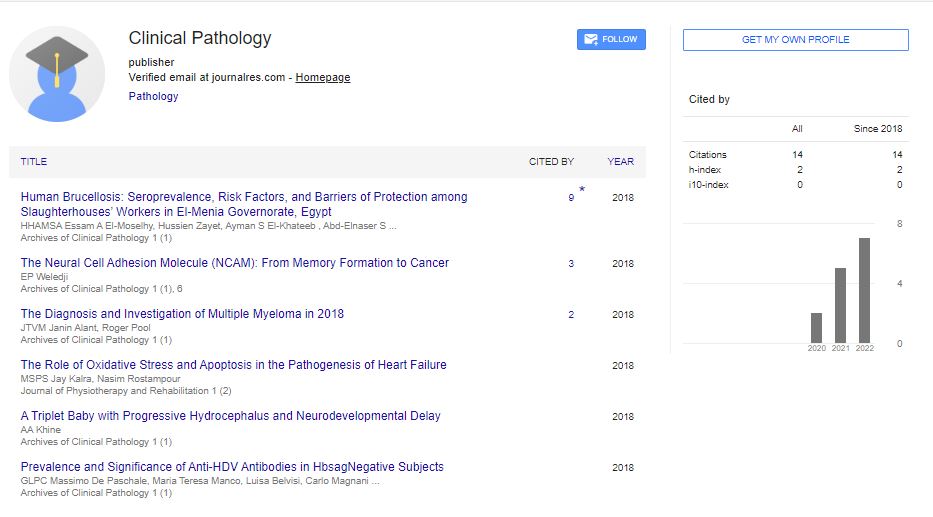Perspective, Arch Clin Pathol Vol: 6 Issue: 1
Significance of Molecular Pathology in Precision Medicine and its Detection
Lewis Antonio*
Department of Public Health, University of Naples Federico, Naples, Italy
*Corresponding Author: Lewis Antonio
Department of Public Health, University of Naples Federico, Naples, Italy
E-mail: lewisantonio@unf33.it
Received date: 20 February, 2023, Manuscript No. ACPY-23-96248;
Editor assigned date: 22 February, 2023, PreQC No. ACPY-23-96248 (PQ);
Reviewed date: 09 March, 2023, QC No ACPY-23-96248;
Revised date: 16 March, 2023, Manuscript No. ACPY-23-96248 (R);
Published date: 23 March, 2023, DOI: 2324-8955/acpy.05.03.100078
Citation: Antonio L (2023) Significance of Molecular Pathology in Precision Medicine and Its Detection. Arch Clin Pathol 6:1.
Description
Precision medicine is an emerging field that aims to provide more personalized treatment options for patients based on their individual genetic makeup, lifestyle, and environmental factors. Molecular pathology, which is the study of the molecular and genetic basis of disease, plays an important role in precision medicine by providing insights into the underlying molecular mechanisms of diseases and identifying potential targets for therapeutic intervention. One of the main goals of precision medicine is to move away from a one-sizefits- all approach to disease treatment and develop therapies that are tailored to individual patients.
This requires a deep understanding of the genetic and molecular causes of disease, which is where molecular pathology comes in. By analyzing the genetic and molecular characteristics of a patient's disease, molecular pathologists can identify specific molecular targets that can be used to develop personalized treatments. For example, in cancer treatment, molecular pathology plays a vital role in identifying specific genetic mutations and other molecular alterations that are driving the growth of the tumour. By targeting these specific molecular changes, physicians can develop personalised treatments that are more effective and have fewer side effects than traditional chemotherapy or radiation therapy.
Molecular pathology is also essential in the development of new drugs and therapies. By understanding the molecular mechanisms of diseases, can identify new targets for drug development and develop more effective treatments. For example, in the field of oncology, analysts are developing drugs that target specific molecular pathways that are involved in tumour growth and development. One example of the application of molecular pathology in precision medicine is the use of targeted therapies for cancer. By analysing the molecular profile of a patient's tumour, molecular pathologists can identify specific genetic mutations or alterations that are causing the cancer's growth.
This information can then be used to select targeted therapies that specifically target those mutations or alterations, leading to a more effective treatment with fewer side effects. Another area where molecular pathology is essential in precision medicine is in the diagnosis and treatment of infectious diseases. By analyzing the genetic material of pathogens, molecular pathologists can identify specific strains of bacteria or viruses that are causing infections, allowing for more targeted and effective treatments.
One of the primary diagnostic methods in molecular pathology is the Polymerase Chain Reaction (PCR). PCR is a technique that amplifies a specific segment of DNA, making it easier to detect and analyse. This is particularly useful in cancer diagnosis, as many cancers are caused by specific mutations in DNA. By using PCR to detect these mutations and can determine the type and stage of cancer and develop a personalised treatment plan. Another important diagnostic tool in molecular pathology is Immuno Histo Chemistry (IHC). IHC involves staining tissue samples with antibodies that bind to specific proteins. IHC is particularly useful in diagnosing and treating cancer, as different types of cancer have different protein markers.
Conclusion
Molecular pathology is an important component of precision medicine, providing valuable insights into the underlying molecular mechanisms of disease and identifying potential targets for therapeutic intervention. As precision medicine continues to gain momentum, the importance of molecular pathology is only set to increase, and it will undoubtedly play a significant role in shaping the future of medicine. Its applications in cancer treatment, genetic disorders, drug development, and infectious disease diagnosis and monitoring are just a few examples of its far-reaching impact on modern healthcare.
